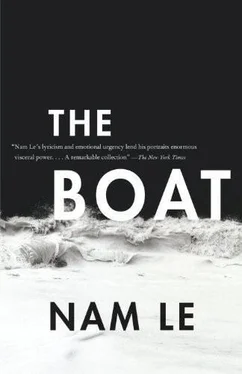The two of them start doctor-talking. I'm ordered to shift onto my left side. Someone lifts my right buttock, then from the locus of my rosebud the cold-hot pain flares again through the grid of my body. I can't breathe. It's okay, the doctor says. Slowly, breathe slowly through my mouth. Then he talks to Birdgirl, quick-fire, every word punctuated by a twist in my guts. The hosing goes in so deep it feels like part of it might snap off, stay trapped in there. My wobbling fingers drop the cigarette. I arch my head to look at the laptop screen, for some sign that it's worth it, that it'll be over soon, but all I see are smudges of gray and white. Large, hob-knuckled fingers pointing to them.
Then silence. The doctor and his sidekick are studying something on the screen. They mutter, speaking in Latin and percent ages. I rest my eyes. On the website photo she's got her mother's mouth. It doesn't smile.
"It's a big deal," Birdgirl says in a casual voice. When I turn to look I see it's Olivia; she's running her hands in small circles on her white smock, shaking her head at my thickness. "Of course it's a big deal. The Mayakovsky String Quartet. Carnegie Hall. Eighteen years old."
"She's getting married," I say. "To her manager."
"It's a big deal. It's serious."
"He's English."
"It's serious."
I agree with her — I'm nodding full of agreement when a putrid smell jogs me awake. Old anchovies and drain-clogged vegetables. The doctor, an inch from my face. My eyes heave into focus.
"Henry. You all right?"
Without asking permission I pull up my crinkled pants, cram my shirt into them and haul myself upright with only a slight moan. My feet dangle, toes stretched down, trying to hook my shoes. She doesn't usually come so close, so clear. The doctor confers with Birdgirl in a low tone. Then he turns to me.
"You have a number of adenomatous polyps in your colon."
"It's not your fault, Doc," I joke automatically. I grope again for my shoes.
"Most polyps are benign and the sigmoidoscope can remove them. However, the size and number of adenomatous polyps I have observed means we will have to carry out further tests."
"It's serious," Birdgirl murmurs. The doctor glances at her and she frowns, blushing.
At this point I catch on. They're not talking about my hemorrhoids. I zip up my pants.
"Tests? For what?"
He shows me pictures he's saved on the laptop. The polyps, he explains, are superfluous bits of tissue, generally shaped like mushrooms. There, he points, and there. I study the grainy images, trying, pretending to see. Then I see: the colony of little mushrooms in my colon. He's only inspected one third of it. He will perform biopsies through a colonoscope, he tells me, during a full colonie examination. He has awful breath. He will use a scythe-like wire to harvest my mushrooms, but there is a chance that malignant cells have already metastasized into my bloodstream or lymph system. I'm having trouble getting past the mushrooms. Birdgirl looks down, nods thoughtfully.
"Give it to me straight," I say.
Hingess is one of the most expensive gastro men in town and this is why I pay him: for his straight-shooting, no-holds-barred, expert opinion: "You will very likely develop colorectal cancer," he says, "if you haven't done so already."
I'm a painter. A good one, by most accounts. I look for the angles, the things that lend complexion, the joke in things. My doctor's mouth smells like a fish has flipped inside and died. I'm sweating in my penguin suit, my asshole burning from all the wrong-way traffic. There's a girl in the room who I'd jump if I could stand up, but even if I did — get this — her face wouldn't budge from the same mix of tenderness and pity holding it together now.
I'm looking, waiting, but I can't find it. It doesn't exist. There is no joke.
***
IT WAS JACOB APELMAN'S DOING that I met Olivia eighteen years ago, when I was unhappily married to a terminally passive-aggressive wife, father to a chronically ailing baby daughter, and caretaker of a career that made my domestic life seem idyllic. I'd been with him a few years — he wasn't yet the hotshot he is now, of course — and maybe I wasn't his most gracious artist. In any case, when a life-study model canceled at the last minute, Apelman kept mum (he said later he was afraid I'd take it personally) and found a girl to replace her. He didn't tell me she was seventeen years old, had never modeled before, had been plucked like an apple from Washington Square.
The girl had a boyish haircut and a botany textbook. Immediately she took charge. Without a word, she let her clothes fall to the floor and stepped out of them, as though from a pool of water. My studio — the top floor of an old box factory in Gowanus — faced westward, and as the day wrung itself into evening the sunlight streaked across the river and through my tall, rust-flecked windows, stenciling light and shadows across the room. A chintzy coral effect. The girl ignored the chair, sat on the cement, naked, on a reef of light. She sat so her knees touched, her feet splayed apart to create a triangle of dark space. I was taken aback by the perfect fluke of the composition. Then, cool as you like, she picked up her book and said: I'm ready .
For years after that day, I'd continue to be amazed by the ability of her body to hold light. Even at the end — when she was flat and wooden under the hospice sheets. I'd watch her endlessly: following her body across each foot and nook of my studio; outside, walking through Central Park, lying down, the sun caught in her skin — or in bathtubs, watching how the water refracted the light on her face. I'd paint. It felt like cheating. Even after she moved in-after my wife and daughter left — she posed for me almost daily. Then, when she was tired of being watched, she'd lick a fingertip as though to turn a page but the finger would drop below her book and dangle over her groin. This didn't mean anything special, of course. If she smiled, though — not any old stretch but a smile broad enough to reveal her chipped canines — that was it, my cue, the first infallible move in our formula of sex. Always enough — there and then — to make me happy.
***
OLD APELMAN BEAMS WHEN HE SEES ME. "The big day!" he cries out, before marching across the polished floorboards of his gallery dodging sculptures made of wire and rubber bands, to give me a hug. Apelman's a sucker for all that man-to-man contact stuff. Right now, though, I'm a convert. I can't get enough: I'm nestling my chin against his beard when he shoves me away, pats me hard on the back a couple of times and says, "You smell like the main floor at Bloomingdale's."
It's true-I smell good. Mixed with sweat, the half ounce of French cologne I splashed on this morning seems to have brought forth a chemical pungency.
"And hey, buddy, did I see you power walking just now?"
I realize, after a while, he's talking about my squirmy, gimpish gait. A new aerobic regime, I tell him. We joke around about black-tie marathons and cardiac arrests — who'll finish first — but my heart's not in it. My mind's jammed. I know why I'm here — I'm ripe for Apelman's pep — and honestly, I'm trying to follow him as he jabbers away, but in my head I'm still inside her matchbox apartment, sharing a bathtub so small we both sit chin to knee; I'm watching her eat, sloppily lips smeared with mango juice, sweet with the nectar of plums. I never thought it would be me: the painter who falls for his nude model. I love that , she says. What? When you look at me too long . Then she smiles. I drag her toward me, fend her off. Through it all, she loves hitting me. Her lips turn martial. Afterward we fall apart, marks on our bodies, smelling of fruit and mineral spirits, soap and charcoal. You're a dirty old man , she says, giving me her best dirty young girl look, steering my cigaretted hand to her lips. I leave, each time, with new bruises.
Читать дальше











